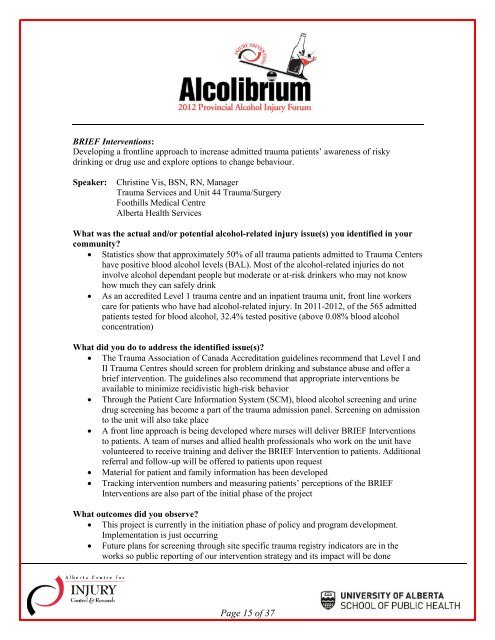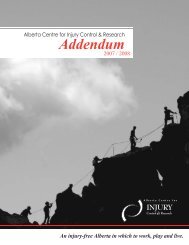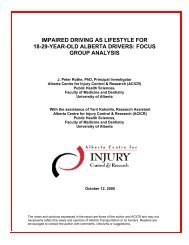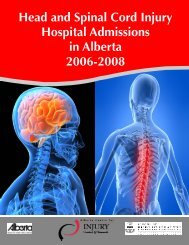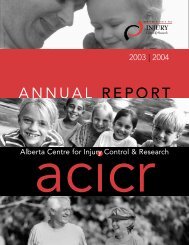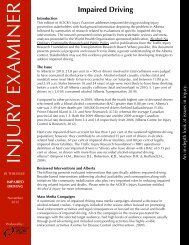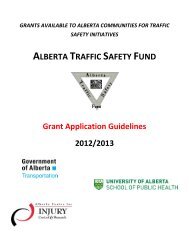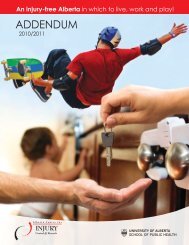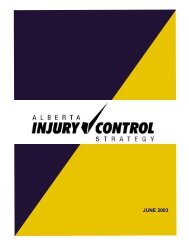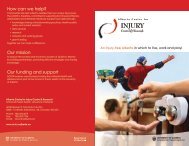Delegates Program - Alberta Centre for Injury Control & Research
Delegates Program - Alberta Centre for Injury Control & Research
Delegates Program - Alberta Centre for Injury Control & Research
Create successful ePaper yourself
Turn your PDF publications into a flip-book with our unique Google optimized e-Paper software.
BRIEF Interventions:<br />
Developing a frontline approach to increase admitted trauma patients’ awareness of risky<br />
drinking or drug use and explore options to change behaviour.<br />
Speaker:<br />
Christine Vis, BSN, RN, Manager<br />
Trauma Services and Unit 44 Trauma/Surgery<br />
Foothills Medical <strong>Centre</strong><br />
<strong>Alberta</strong> Health Services<br />
What was the actual and/or potential alcohol-related injury issue(s) you identified in your<br />
community?<br />
Statistics show that approximately 50% of all trauma patients admitted to Trauma Centers<br />
have positive blood alcohol levels (BAL). Most of the alcohol-related injuries do not<br />
involve alcohol dependant people but moderate or at-risk drinkers who may not know<br />
how much they can safely drink<br />
As an accredited Level 1 trauma centre and an inpatient trauma unit, front line workers<br />
care <strong>for</strong> patients who have had alcohol-related injury. In 2011-2012, of the 565 admitted<br />
patients tested <strong>for</strong> blood alcohol, 32.4% tested positive (above 0.08% blood alcohol<br />
concentration)<br />
What did you do to address the identified issue(s)?<br />
The Trauma Association of Canada Accreditation guidelines recommend that Level I and<br />
II Trauma <strong>Centre</strong>s should screen <strong>for</strong> problem drinking and substance abuse and offer a<br />
brief intervention. The guidelines also recommend that appropriate interventions be<br />
available to minimize recidivistic high-risk behavior<br />
Through the Patient Care In<strong>for</strong>mation System (SCM), blood alcohol screening and urine<br />
drug screening has become a part of the trauma admission panel. Screening on admission<br />
to the unit will also take place<br />
A front line approach is being developed where nurses will deliver BRIEF Interventions<br />
to patients. A team of nurses and allied health professionals who work on the unit have<br />
volunteered to receive training and deliver the BRIEF Intervention to patients. Additional<br />
referral and follow-up will be offered to patients upon request<br />
Material <strong>for</strong> patient and family in<strong>for</strong>mation has been developed<br />
Tracking intervention numbers and measuring patients’ perceptions of the BRIEF<br />
Interventions are also part of the initial phase of the project<br />
What outcomes did you observe?<br />
This project is currently in the initiation phase of policy and program development.<br />
Implementation is just occurring<br />
Future plans <strong>for</strong> screening through site specific trauma registry indicators are in the<br />
works so public reporting of our intervention strategy and its impact will be done<br />
Page 15 of 37


